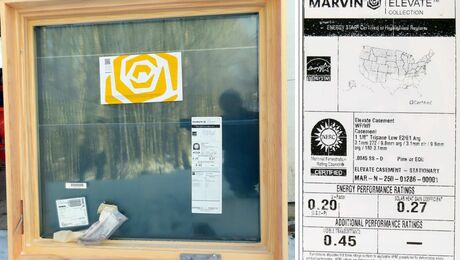Minimizing Noise from Outdoor Heat Pump Condenser
I am on a strata council for some 1988 vintage townhouses in the Vancouver area (Climate zone 4). We need to entertain requests for heat pump installations for the first time, primarily motivated by the record breaking heat last year.
As this will require a bylaw, Does anyone have advice of best practices that would be good to include in the bylaw?
What are the best ways to minimize outside noise? The area is quiet so even a low db machine will be noticed and possibly result in neighbors complaining.
Lastly, how does the electrical draw on a heat pump compare in the summer vs the winter? I would think the summer draw would be less as temperature differential between the outside temp and the desired inside temperature is much less.
Thanks For Your Help!
GBA Detail Library
A collection of one thousand construction details organized by climate and house part









Replies
What are you currently doing for heat, gas electric resistance?
Every condo I have seen electrical system had very little if any room left for adding loads unless you are removing electric baseboard heater it seems you will be upgrading service panels and electric meters sockets.
It seems like the board often pick one or two makes and models they will approve. If you let every unit pick a different brand some will make more noise than others, they will be all different shapes, sizes, colors and it starts looing like a trailer park.
Walta
Every townhouse has 3 1000 watt 220v baseboard heaters. One for each of the 3 upstairs bedrooms.
Based on feedback from an electrician, the heat pump should be the same or less. I do worry that there is limited expertise with heat pumps in this area (its rare for houses to have AC here) and invarably someone is going to get a poorly spec'd unit that is going to cause issues.
My two minisplits are each on 15 amp, 240 volt circuits.
The biggest culprit for noise is the compressors on most units. Since the sound these generate is at line frequency and its harmonics (60Hz and 120Hz) which is pretty low frequency and will readily make it though walls and windows. Even higher end two stage units have this sound.
The best way to reduce sound is spec inverter units (that is SEER 19 and above). These run nearly silent, the noise they make tends to be airflow which is a more pleasant white noise. Since these units are more efficient some people might think that this is a left green agenda, so might be better to have a sound spec. Most inverter units will fall bellow 60dB, whereas almost no other type of unit is bellow 70dB.
You never want to mount the outdoor unit onto wood framed construction walls or roofs. Even the quietest units produce vibration which will be readily carried through light weight structure. This could be an issue if the party walls are wood framed, less of an issue if they are masonry. The simplest is to require the units be mounted either onto masonry walls (if they exist) or ground mount them.
You can allow roof mounts provided the party walls are masonry since this will only annoy the people directly bellow.
Looking around me, lot of the stacked townhouses have the outdoor unit either at the front beside the entrance staircase or on balconies.
The best way to reduce sound is to mount the outdoor unit on a ground mounted stand, then bring the lines into the structure with a loop and not a straight run. The idea is to isolate the unit's vibration from the wall of the structure to minimize conducted sound and the "sound board" effect if the unit resonates the wall. It's relatively easy to make a stand out of strut and bolt that to a concrete pad or even a large precast concrete paver.
If you have a multiple occupancy building with multiple levels, it may be difficult to mount all the outdoor units at ground level. If you have to mount them on the wall, you still want to loop the lines, but you'll need vibration isolators too. This is far less effective than the isolation you get with a seperate ground mount though. You will gain some additional sound reduction by mounting the units to rim/band joists and not further up on studwalls. By mounting the untis to what amounts to the end of the floor joists, you have a more rigid mounting which means less resonances. If you mount the unit halfway up a studwall (the worst location), the unit will tend to vibrate the wall and the wall will act to amplify the sound from the unit.
Bill
Great, thanks for the info.
I just stumbled agross these two seminars put on by the Vancouver Island Strata Owners Society if any other Canadian readers are looking for some advice on managing the strata Bylaw side of things. I found these helpful too:
Short video on considerations when putting together a heat pump bylaw:
https://youtu.be/GPUGx_jun_Q
1 hour presentation covering what you will need to consider for a Strata Bylaw:
https://youtu.be/PB8mDAz5Vko